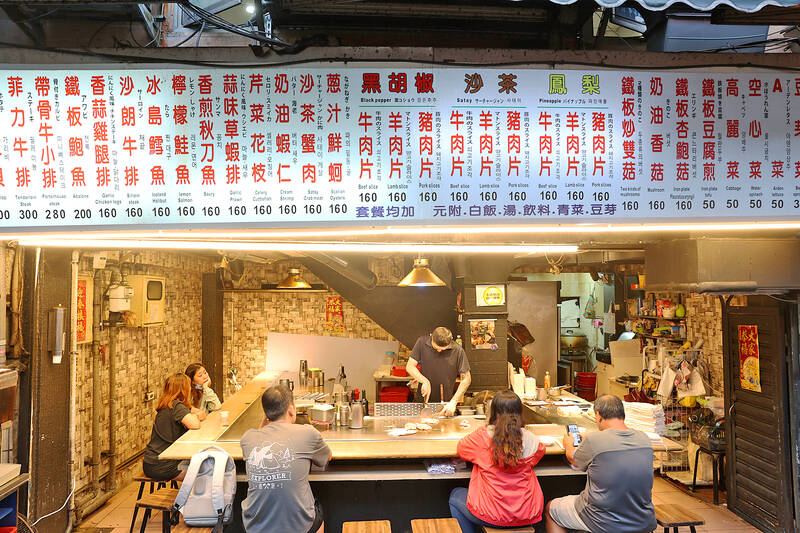The consumer price index (CPI) last month showed a 1.82 percent rise from a year earlier, the lowest in eight months and below the central bank’s 2 percent target, as food costs held relatively stable, the Directorate-General of Budget, Accounting and Statistics (DGBAS) said yesterday.
The inflationary gauge is likely to hover below the 2 percent level going forward, in the absence of major abnormal surprises, despite Typhoon Krathon earlier this month and the recent rise in international oil prices, DGBAS official Tsao Chih-hung (曹志弘) said.
“The crop damage wreacked by Typhoon Krathon is not as serious as that left by typhoons a year earlier,” Tsao said.

Photo: CNA
Food costs last month grew a moderate 3 percent, as fruit prices rose 17.37 percent, but vegetable prices decreased 4.21 percent and egg prices declined 15.49 percent, the DGBAS said.
The core CPI, a more reliable long-term price tracker because it strips out volatile items, increased 1.79 percent, virtually unchanged from one month earlier and affirming a stable consumer price trend, the statistics agency said, adding that the CPI value after seasonal adjustments gained 0.38 percent.
However, the public might still feel the pinch because dining out prices climbed 2.98 percent, rents increased 2.5 percent, and medicine and healthcare prices rose 2.61 percent from a year earlier, Tsai said.
Shelter prices also expanded 2.39 percent, attributable to more expensive home maintenance costs, as well as electricity rate hikes from April onward, while education and entertainment prices added 1.79 percent, DGBAS data showed.
The producer price index (PPI), which measures the price movements of goods from a seller’s perspective, shrank 0.33 percent year-on-year last month, owing to price corrections for international fuel, food and electronic components, the agency said.
In the first nine months of this year, the CPI grew 2.26 percent, while the PPI rose by 1.47 percent from the same period of last year, it said.

MULTIFACETED: A task force has analyzed possible scenarios and created responses to assist domestic industries in dealing with US tariffs, the economics minister said The Executive Yuan is tomorrow to announce countermeasures to US President Donald Trump’s planned reciprocal tariffs, although the details of the plan would not be made public until Monday next week, Minister of Economic Affairs J.W. Kuo (郭智輝) said yesterday. The Cabinet established an economic and trade task force in November last year to deal with US trade and tariff related issues, Kuo told reporters outside the legislature in Taipei. The task force has been analyzing and evaluating all kinds of scenarios to identify suitable responses and determine how best to assist domestic industries in managing the effects of Trump’s tariffs, he

TIGHT-LIPPED: UMC said it had no merger plans at the moment, after Nikkei Asia reported that the firm and GlobalFoundries were considering restarting merger talks United Microelectronics Corp (UMC, 聯電), the world’s No. 4 contract chipmaker, yesterday launched a new US$5 billion 12-inch chip factory in Singapore as part of its latest effort to diversify its manufacturing footprint amid growing geopolitical risks. The new factory, adjacent to UMC’s existing Singapore fab in the Pasir Res Wafer Fab Park, is scheduled to enter volume production next year, utilizing mature 22-nanometer and 28-nanometer process technologies, UMC said in a statement. The company plans to invest US$5 billion during the first phase of the new fab, which would have an installed capacity of 30,000 12-inch wafers per month, it said. The

Taiwan’s official purchasing managers’ index (PMI) last month rose 0.2 percentage points to 54.2, in a second consecutive month of expansion, thanks to front-loading demand intended to avoid potential US tariff hikes, the Chung-Hua Institution for Economic Research (CIER, 中華經濟研究院) said yesterday. While short-term demand appeared robust, uncertainties rose due to US President Donald Trump’s unpredictable trade policy, CIER president Lien Hsien-ming (連賢明) told a news conference in Taipei. Taiwan’s economy this year would be characterized by high-level fluctuations and the volatility would be wilder than most expect, Lien said Demand for electronics, particularly semiconductors, continues to benefit from US technology giants’ effort

‘SWASTICAR’: Tesla CEO Elon Musk’s close association with Donald Trump has prompted opponents to brand him a ‘Nazi’ and resulted in a dramatic drop in sales Demonstrators descended on Tesla Inc dealerships across the US, and in Europe and Canada on Saturday to protest company chief Elon Musk, who has amassed extraordinary power as a top adviser to US President Donald Trump. Waving signs with messages such as “Musk is stealing our money” and “Reclaim our country,” the protests largely took place peacefully following fiery episodes of vandalism on Tesla vehicles, dealerships and other facilities in recent weeks that US officials have denounced as terrorism. Hundreds rallied on Saturday outside the Tesla dealership in Manhattan. Some blasted Musk, the world’s richest man, while others demanded the shuttering of his